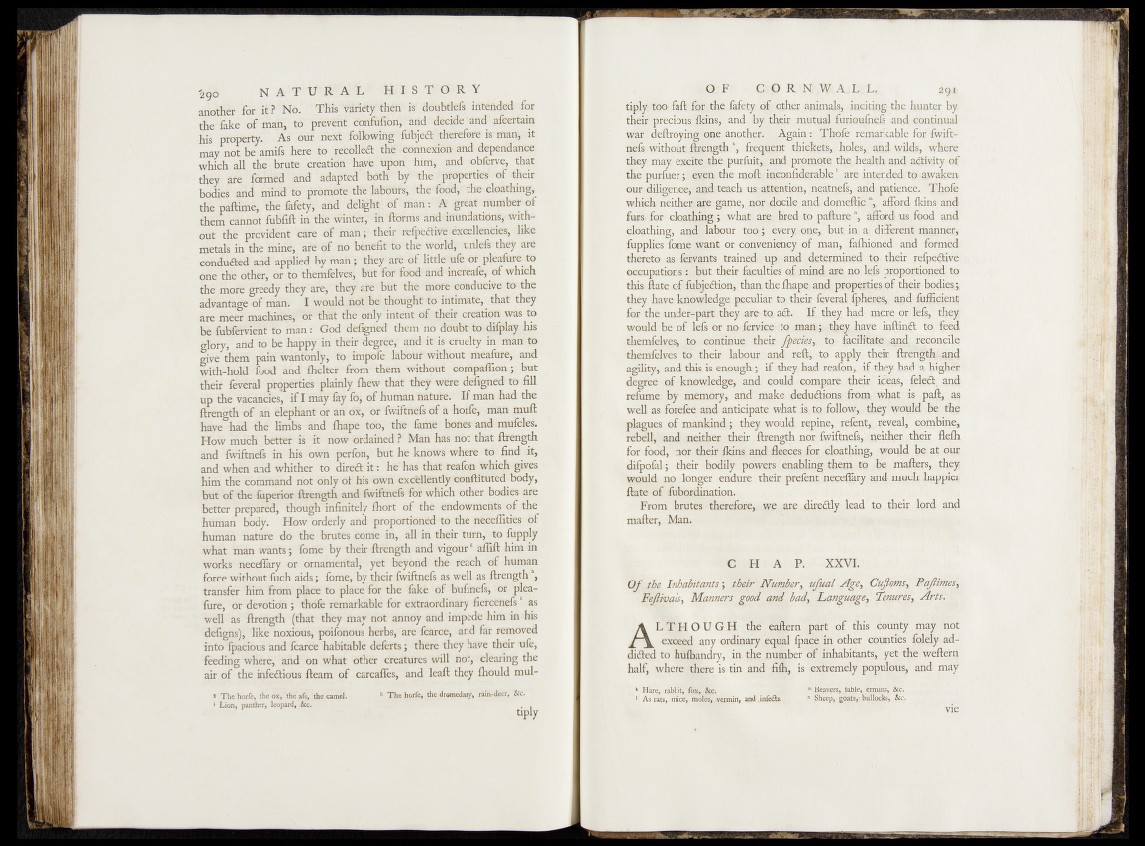
anotfier for if? No. This'vdriety-then g douMefe' intended for
the fake of man, t<T prevent eoriftffiori, and1 JeeiSfe ’ «ted- afetai®
his property. Xs our next following fd^e^ fherefbfe is 'M a ,-it
may not be amifs here to recollea ^thgitenfnexf&W afrd dependaasce
which all the briite creation have, upon him, and obferve, that
they are forced hhd a d a p f^ ,!b 6 f lfb f^ h e p^opefti^ (§f #e ir
bodies and miiid to pfdihdffi tHe labtrtits, the & i v v tht ^l£^fflgy
the paftime, tfie Mety, and delight Hainan: A great number of
them cannot fubfift in the winter,1
oiit the pfoVideiit care of mⅈ their re^fe^Vfe'eSeeltehdies, like
metals in the mine, afe of no Mriefit'tb tte Wolldi, ftiilife they ate
conduced and applied by man; they are o f little tife or pleafore to
one die other, or to themfelves, blit for food and incfeafe; of which
the more greedy they ate, they ate but the mofe conducive to the
advantage of man. I would not be thought to intimate, that they
are meer machines, or "tfcKt the only latent of theif creation was to
be fubfervient to man : God defigned them rib cfoufet to cl^lay his
^017, and to be happy in their degtee, and ittiScfueliy in man to
give them pain wantonly* to iinpo fe labouf Without meafure, and
with-hold food and fhelter from them without cOm^tiion; but
their feveral properties plainly fhew that they wbre dellgneoi to fill
Up the vacancies, if I may % fbj of human nature. I f man had the
ftrength o f an elephant or an ox, or fwiftnefs of a hoffe* man muff
have had the limbs and fhape too, the fame bones and mufcles.
How much better is it now ordained ? Man has hot that ftrength.
and fwiftnefs in his own perfbn, but he knbws where to find it,
and when and whither to dired it: he has that reafon which#ves
him the command not only of his oWri excfcftently t$nftit#ed body,
but of the fuperior ftrength and fwiftnefs for which other bodies arb
better prepared, though infinitely fhort o f the endowments o f the
human body. How orderly and proportioned to the aSdeffitaes of
human nature do the brutes come in, all in their turn, to fupply
what rnan wants; fbme by their ftrength and vigour8 aflift him in
works neceflary or ornamental, yet beyond the reach of human
force without fuch aids; fome, by their fwiftnefs as well as ftrength “,
transfer him from place to place for the fake of bufinefs, or plea-
fure, or devotion ; thofe remarkable for extraordinary fiercenefs1 as
well as ftrength (that they may not annoy and impede him in his
defigns), like noxious, poifonous herbs, are fcarce, and far removed
into fpacious and fcarce habitable defeits; there they have their ufe,
feeding where, and on what other creatures will not, clearing the
air o f the infectious fleam of carcafies, and leaft they fhould mul-
* The horfe, the ox, the afs, the camel. h The horfe, the dromedary, rain-deer, Sc.
1 Lion, panther, leopard, Sc. - . .
tiply
tiplytoo- foft'fop; the fafety- q|h®fhs£ animals, inciting, the hunter by
th^^recious 4 ins, > ai|cl^ by their, ai^ continual
War deftroyin^»one anothe^^^^paiia s; Thofe remarkable for fwift-
nefe.withou:M fkength k, fogqilpat thickets, holes, and wilds, where
they may» esddei^rfwtrfuk*. and: promote th^heailhjand. a4ti?0ty;©f
the purfuer.; esp® the mofl^i®k®nfidgjablQ1 > arg- intended-. t& awaken,
our- diligence; apd teach us-^tsgntip®, neatflftfej a^Upaitkafe.: Thpf^
which neither: are game.,, nor afford |!®p3 and
fEms, for rlrwthing what are: hted.ts> pkipfoY pp^r^iU^sfeod
cloatning, an^ ,labour toe||®vpfw but, in„ different manner,
fupplies fomggwant or convdniefl.oy of Crpap,» fafhioned and formed
thereto as feiyanta tein^i>i;u|^ to, th^ir refpe&ive
oeeupations : but their faculties of mind aa® ^ojlgff proportioned to
this ftate of fub^dtion, thaathefhape, an.ffpfoportip; <?f theff bodies,;
they have knowledge peculiar to, thpij? feveralj fphgaj^, ggd fiafficieo^
for the under-pact they are ai£lU. If. they had: mpte ©rr fefi, they
would be o f lefa or w> feryke to man-j: thby haye,, k'ftjnig; tO; ‘ feed,
tkemfekea» to oantiaue the« «an(dkre,oojacile
themfelves to thew labour a a l. reft,, t# ajp|iy' .nspK
agility, and this is enough; if .they had rekfeu,, *.a< high^
degree of knowledge, and could compare thei|-’ idha^, kfe'ft. and
rdume hyi memory, and make. paj^, as
w e l as forefee and anticipate what is. to. follow>, they wo,uM be the
plagues o f mankind; they would repine, refenfe.,?eveal, combinca
rebell', and neither their, ftxeogth
for food, nor their ikins and fleeces for ^oat^lng, weuJd be at oj^
djfpofal ; their bodily powers enabling them to be rrxafters, they
would no longer endure their prefent neceflary and much happier
ftate of fbbordination.
From brutes therefore, we atiil
mailer, Man.
C H A P . XXVI.
O f the Inhabitants; their Number, tfptrf
Fejitvals, Manners good and bad\ language, Tenures? Arts.
AL T H O U G H the ea&ern part of this county may hot
exceed any ordinary equal fpace in other counties folely- ad-
didted to htlfbandry, in the number o f inhabitants,’ yet the weftern
half, where there is tin and fifh, is extremely populous, and may
k Hare, rabbit, fox, Sc.
1 As rats, mice, moles, . vermin, and .infers,.
m Beavers, fablje, .caanios, &c.
" Sheep, goats,* bullocks, &c.
vie